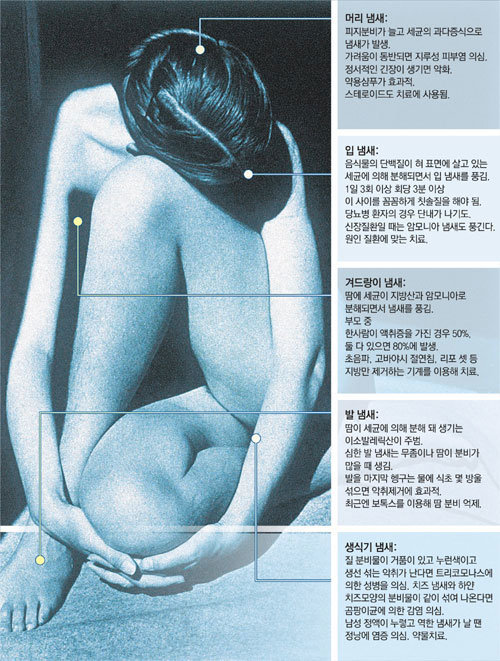Body Odor

Perspiration and Body Odor
There are two different types of sweat glands: the eccrine gland, which secretes pure sweat, and apocrine gland that secretes proteins and fats. While eccrine glands are widespread through the entire body, apocrine glands are usually present in the armpits, outer ear, navel, nipple and private areas.
Perspiration secreted from apocrine glands is milky, thick and sticky. This sweat is decomposed by bacteria usually within one hour, and in the process, it turns into fatty acids and ammonia, emitting a particular scent.
On the other hand, sweat from eccrine glands is colorless and odorless because it is composed of 99 percent water. When this type of perspiration interacts with germs, a variety of odors are created.
Sharp or spicy odors often come from ingredients present in peoples diets that are secreted through glands. In the same way, someone who is fond of kimchi will sometimes retain the scent of garlic because the ingredients of kimchi, when eaten regularly, continue to be secreted from the body.
While menstruating, female body scents often become stronger as well. That is because two weeks prior to menstruating, a womans male hormone level increases, increasing the amount of sebum present in skin pores and making nasal sense receptors more sensitive.
Scalp Odor
Scalp odor usually occurs because of an increase in sebum secretions. In particular, people with heavy scalp perspiration often experience this. When secreted sebum is mixed with perspiration and bacteria, a scent is produced. The sweat glands responsible for this are the eccrine glands.
Underarms
Germs decompose perspiration secreted from apocrine glands into fatty acids and ammonia underneath peoples arms, causing odor. Severe bromidrosis, or strong armpit odor, is caused by the sudden enlargement of sweat glands around the age of 10 due to hormonal influence. The elderly usually do not suffer from bromidrosis because their hormonal functions are lower. If the smell is not strong, frequent bathing or deodorants are usually enough to treat bromidrosis. If not, surgery may be indicated.
Seoul Samsung Hospital plastic surgeon Oh Gap-seong says, Currently there are various methods to eliminate sweat glands, including small incisions in the armpit using ultrasonic waves, Kobayashi thermolysis, liposuction, and laser surgery, but the rate of recurrence is higher than normal surgical procedures.
Other Odors-
Urine is virtually odorless, so an associated odor can be indicative of a severe bladder inflammation or urethral infection.
A common cause of urethral infection is E. coli. Its symptoms include yellowish pus and a peculiar smell. Rarely, there will also be greenish pus. A sweet smell similar to that of grapes will also be present.
A normal feminine discharge is mostly caused by epithelium cells mixed in the discharge reacting with lactobacillus. An unusual discharge may be indicative of a sexually transmitted disease.
Ewha Women`s University Mokdong Hospital urologist Yoon Ha-nah says, Once in a while, young women have significant feminine discharges which can happen when a tampon or contraceptive device is neglected for too long a period of time.
Meanwhile, an unusual male discharge can be indicative of a seminal vesicle infection.
Feet
The main culprit behind foot odor is isovaleric acid produced by germs and sweat secreted from eccrine glands. But severe foot odor can have other causes, too. The most common is athletes foot, which is caused by the growth of bacteria and fungi on the feet.
In addition, more perspiration than average will also lead to odor. This sometimes occurs when there are thyroid gland or neural disorders present. Anxiety, stress, tension, and exercise can worsen feet odor. In such cases, relaxing, drug therapy to reduce perspiration, and electrolysis (sending weak electric currents to feet,) are some popular treatments.
Jin-Han Lee likeday@donga.com







